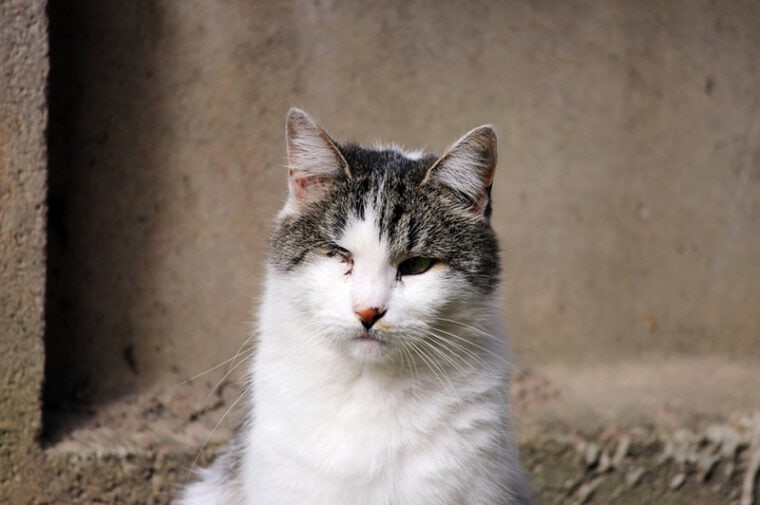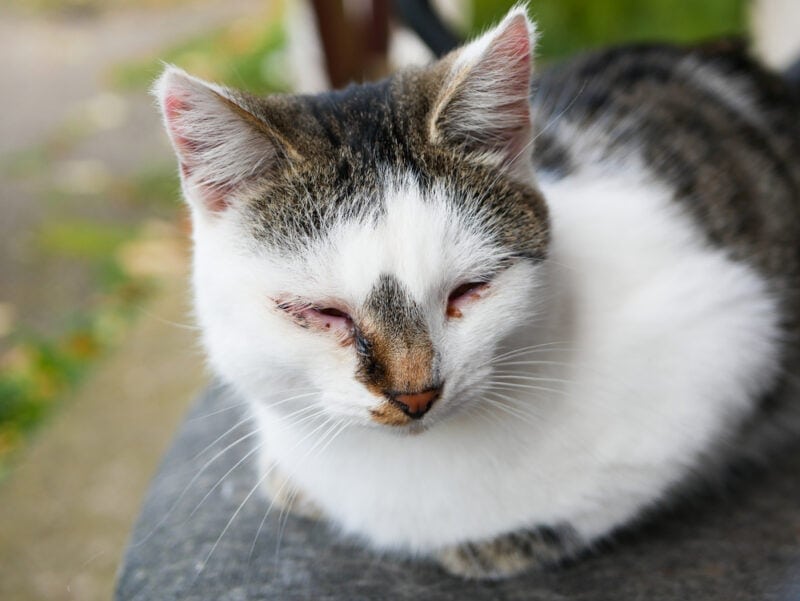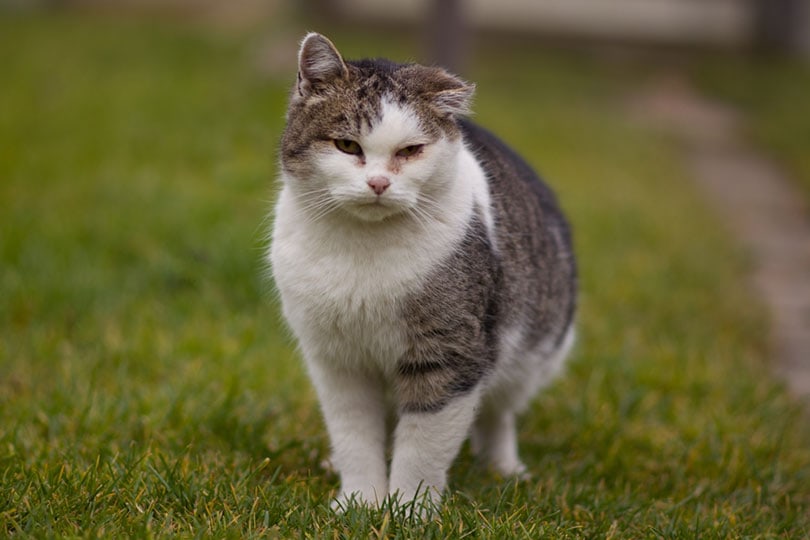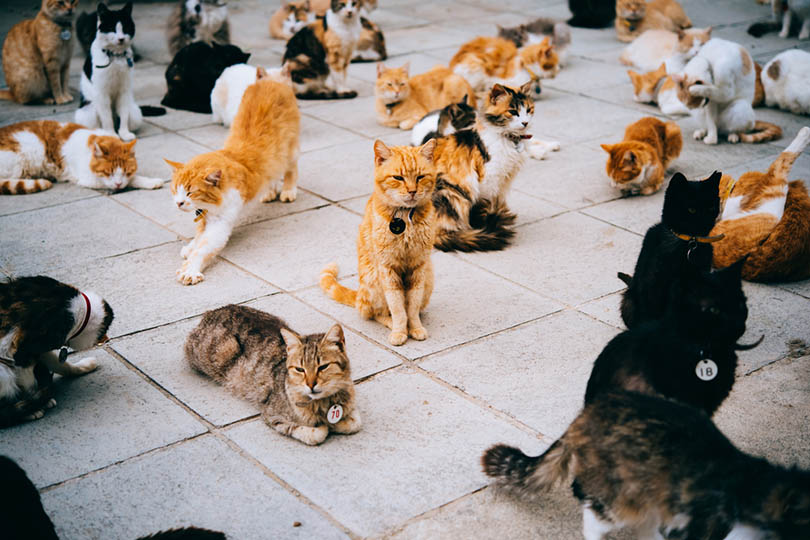
Click to Skip Ahead
Feline herpes, or feline herpesvirus-1, is a significant cause of acute upper respiratory infections in cats of all ages. The highly contagious virus is known to cause feline viral rhinotracheitis (FVR) or “cat flu” and is the most common cause of conjunctivitis in cats.
Feline herpesvirus-1 is known to be ubiquitous in cats, as many cats are exposed to the virus at some point in their lives. The virus is commonly found in environments where cats gather in groups: cat boarding facilities, animal shelters/humane societies, rescues, and cat shows. A cat of any age can become infected and sick with the virus, but kittens are especially vulnerable to severe symptoms.
What Is Feline Herpes?
Feline herpes is a virus (feline herpesvirus-1) that commonly causes acute upper respiratory infections in cats and kittens.
Cats infected with feline herpes become carriers for life, meaning the virus remains in their body but can become reactivated, shed, and cause symptoms again in the future, especially during times of stress or immunosuppression.
This virus dynamic is similar to how herpes viruses can behave in humans (e.g., infected people can get cold sores periodically, especially after times of stress or other illness). Like other herpes viruses, the feline herpes virus is species-specific, so it does not spread to other species.

What Are the Signs of Feline Herpes?
The classic signs of feline herpes include the following:
Other less common signs can include:
Rarely, chronic feline herpes infection can lead to skin inflammation and ulcerations.
After exposure to the virus, signs typically show up after a few (2–5) days. Clinical signs typically last for a couple of weeks (between 10–20 days).
What Are the Causes of Herpes?
Feline herpes is caused by feline herpesvirus-1, a type of virus that specifically infects domesticated and wild cats. It is a ubiquitous virus and is the most common cause of upper respiratory infections and conjunctivitis in cats. The virus itself is very similar to the herpes simplex virus in humans (the virus that causes cold sores/oral ulcers and genital herpes in humans). The hallmark of these herpes viruses is their ability to go into “latency” following initial infection. In other words, reactivation and recurrence of disease can occur at various points in life without any new exposures to the virus.

How Do I Care for a Cat With Feline Herpes?
For cats with mild to moderate infections of feline herpes/feline viral rhinotracheitis, their signs can be treated with supportive care. Treatment is focused on their specific signs and complaints with the goal of making sure they are comfortable and are continuing to eat and drink while they recover from their infection.
If a cat has ocular manifestations of herpes infection, they are often treated with topical eye medications. Your veterinarian may prescribe antibiotic ointments or drops or other supportive medication to ensure any secondary infections or damage (corneal ulcers) can heal and don’t cause permanent damage to the eyes. In some recurring cases, a veterinarian may prescribe a special antiviral eye medication called famciclovir.
For cats with severe clinical signs, a veterinarian may prescribe oral antibiotics, oral antiviral medications (like famciclovir), and/or other supportive medication to fight the infection and support the body’s recovery. If your veterinarian prescribes a medication, it is important to follow directions closely and not discontinue medication early even if your cat appears to be better.
Like people, it can be beneficial to expose cats with congested airways to humid environments like a steamy bathroom. This can be done by running hot water in the bathroom or shower faucet to create a steamy room and bringing your congested cat into the room for 10–15 minutes.
For cats who have decreased appetites during their infection, it can be helpful to offer very smelly wet food to increase the palatability of the food. Just like with people, when there is congestion in the nose, there can be a decreased sense of smell which can affect taste and appetite. In some cases, a veterinarian may prescribe an appetite stimulant to encourage a sick cat to eat.
If your cat is very lethargic, depressed, or having trouble breathing, it is important to have your cat evaluated by a veterinarian as it may need more aggressive treatment like intravenous fluids, pain/anti-inflammatory medication, and other supportive care.

 Frequently Asked Questions (FAQs)
Frequently Asked Questions (FAQs)
Can a feline herpes-infected cat infect other cats?
Feline herpesvirus is a highly contagious virus that can easily be spread between cats via direct and indirect transmission. Direct transmission occurs when an infected cat comes into direct contact with another cat, spreading the virus via saliva and other bodily discharges (snot, tears, etc.) Indirect transmission can occur when the virus has contaminated the environment (e.g., bedding, bowls, toys) or the hands of a caretaker. This transmission is especially important in shelter and boarding facilities as staff and volunteers can inadvertently spread the virus if precautions are not taken.
The herpes virus can survive in the environment for a short period of time, as long as it stays moist. Fortunately, once the moisture (e.g., the snot spray from a cat’s sneeze) dries up, the virus dies.
However, the virus can remain infective on hands/skin surfaces for up to a half hour. If the secretions can remain moist on surfaces like water bowls, toys, etc., then the virus can remain infective for up to 18 hours. Otherwise, the virus will likely only remain infective for a few hours once the moisture has dried up.

Can I get feline herpes from my sick cat?
No, the feline herpes virus is specific to domestic and wild cats.
How is feline herpes prevented?
One of the main ways to prevent Herpes infection in cats is through vaccination.
The standard core vaccine for cats includes protection against the feline herpes virus and is intended to significantly reduce the severity of a herpes virus infection if a cat were to be exposed. It does not completely prevent infection. It is important to regularly booster this vaccine as the immunity obtained from these vaccines is short-lived. Your veterinarian can recommend a vaccination schedule for your cat based on its potential exposures and risk for infection.
Because the feline herpes virus can survive for some time in the environment and on skin surfaces, it is important to be aware of how one can clean the environment and prevent spread. The virus can be killed in the environment by disinfectants, such as a diluted bleach solution (1-part regular bleach to 32-parts water). Contaminated objects that are hard (e.g., plastic toys, bowls) should be soaked in this solution for at least 5 minutes. Blankets and soft toys can be decontaminated by thorough washing with hot water and detergent.
After handling an infected cat, hands can be decontaminated by washing with soap and water, followed by an alcohol-based hand sanitizer.

Conclusion
Feline herpes is one of the most common causes of feline upper respiratory infection and is the most common cause of conjunctivitis in cats and kittens. It is a very common virus that can easily be spread between cats. Standard core vaccines for cats can help prevent severe illness. Following initial infection, infected cats remain carriers for life while the virus remains “latent” in their bodies. After periods of stress or illness, the virus can reactivate and cause illness again. If your cat develops signs of a kitty cold or flu, your veterinarian can help provide supportive care to your cat as they recover from this common disease.
Featured Image Credit: wolfness72,Shutterstock






